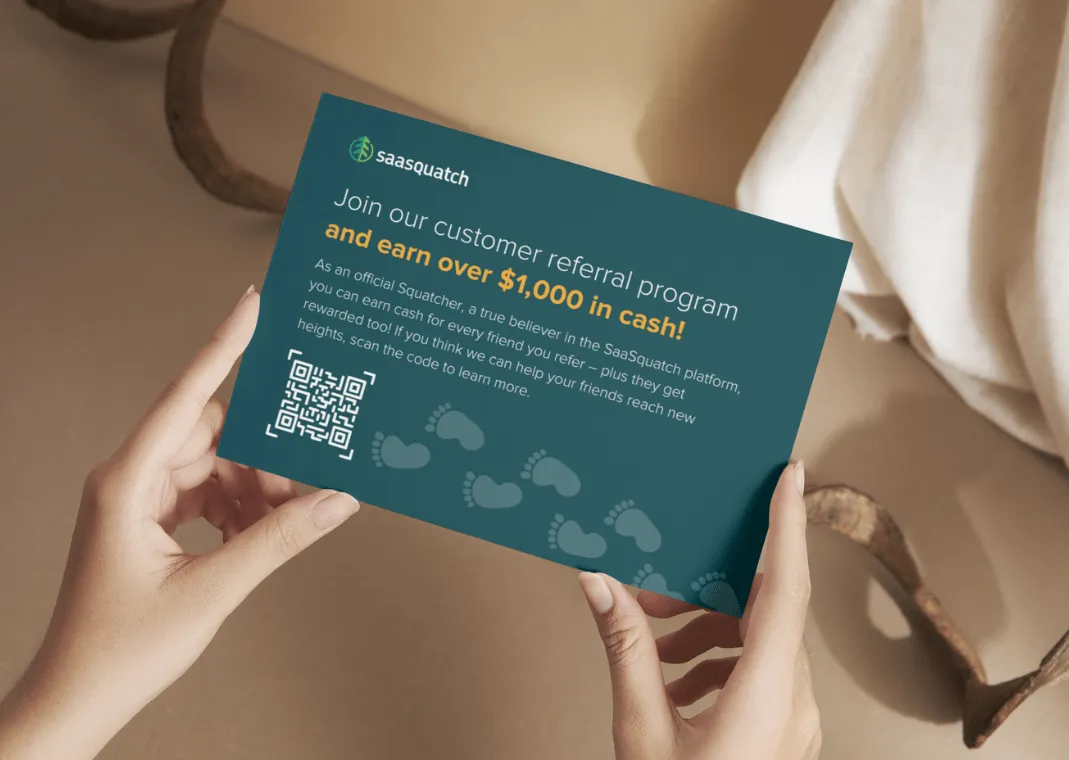The Power of Referral Programs and Ecommerce
Referral Programs for Ecommerce Brands

In the vast and ever-expanding realm of eCommerce, businesses are constantly seeking innovative ways to attract customers and propel their growth. While traditional marketing strategies undoubtedly play a crucial role, there is a potent yet often underestimated force that can take your eCommerce venture to soaring heights— powerful customer referral programs. Proving to be more than a passing trend; they have emerged as a game-changer, reshaping the landscape of online commerce.
Join us to learn why these types of programs are now essential for online businesses, how they work, and the benefits they bring. Whether you’re a budding entrepreneur or an established eCommerce giant, harnessing the power of referral marketing programs can significantly amplify your business’s reach and revenue.
Together, we’ll navigate through the intricacies and opportunities they offer, empowering your eCommerce enterprise to thrive and conquer the digital marketplace like never before.
Are you ready to harness the power of referrals? Let’s dive in!
Understanding the Basics of referral programs
Referral programs, also called refer-a-friend programs, have a long history rooted in human psychology and social dynamics. These programs use personal recommendations to acquire customers and promote brands. Let’s explore the principles behind these programs and how they work.
The Power of Personal Recommendations: Humans have an innate tendency to trust recommendations from friends, family, and acquaintances more than any other form of marketing. Referrals tap into this powerful phenomenon by encouraging satisfied customers to share their positive experiences with others. By doing so, these programs create a ripple effect, generating new leads and customers through the trusted network of existing customers.
Incentivizing Advocacy: To incentivize customers to participate actively, businesses often offer rewards or incentives to both the referrer and the referred individual. These incentives can range from discounts, cash rewards, exclusive access to products or services, or even loyalty points. By providing tangible benefits, businesses motivate customers to become brand advocates and actively promote their offerings within their social circles.
Tracking and Attribution: To ensure fairness and transparency, referral programs employ tracking mechanisms to accurately attribute referrals to the referrers. These mechanisms may involve unique referral codes, personalized referral links, or dedicated landing pages that enable businesses to trace the source of each referral and reward the referrers accordingly.
Seamless Participant Experience: A successful program is user-friendly and seamless. Customers should be able to easily share links or codes, track referrals, and redeem rewards across different platforms and devices. This frictionless experience encourages customer participation and increases the chance of successful conversions.
Social Sharing and Virality: Programs that attract referrals can leverage social media and digital platforms to amplify their reach. By adding social sharing buttons and features, businesses can make it easy for customers to share their brand, products, or services across social networks. This organic sharing can create a snowball effect, as referred customers are 4 times more likely to refer others to your brand, increasing visibility and engagement.
By incentivizing customers, ensuring seamless user experiences, and leveraging social sharing, these programs have become indispensable tools for businesses in the eCommerce landscape. In the following sections, we will delve deeper into the benefits and explore real-life success stories that highlight their transformative impact on eCommerce enterprises.
Benefits of Implementing a Referral Marketing Strategy
Implementing a well-designed referral marketing program can yield a multitude of benefits for your eCommerce business. These programs have proven to be a catalyst for exponential growth and offer unique advantages that traditional marketing methods often struggle to match. Let’s delve into the remarkable benefits, supported by relevant statistics.
Amplified Customer Acquisition
Refer-a-friend programs have the remarkable ability to attract high-quality leads and drive customer acquisition. According to a study by Nielsen, 92% of consumers trust recommendations from people they know, making referrals a powerful tool for acquiring new customers. In fact, the same study found that customers acquired through referrals have a 37% higher retention rate.
Enhanced Brand Trust and Credibility
Word-of-mouth recommendations are rooted in trust, and referral programs tap into this essential element. Research conducted by the Wharton School of Business found that referred customers have a 16% higher lifetime value than non-referred customers. This is attributed to the trust and credibility established through personal endorsements.
Boosted Customer Lifetime Value
Referred customers are more likely to become loyal patrons. According to the American Marketing Association, they have a 16% higher lifetime value and a 25% higher chance of making repeat purchases. Because these types of programs incentivize both the referrers and referred individuals, customer loyalty and lifetime value increases.
Cost-Effective Marketing
Compared to traditional advertising and marketing channels, referral programs offer a cost-effective strategy with a strong return on investment. According to a study by McKinsey, referral marketing generates three times higher conversion rates compared to other marketing methods. Additionally, the Wharton School of Business research mentioned earlier found that referral marketing programs can reduce customer acquisition costs by up to 25%.
Expanding Brand Reach
Referred customers are 18% more likely to refer others to your brand, according to a study by the American Marketing Association. This generates more referrals, expanding your brand’s reach into untapped markets and accessing a wider audience that aligns with your target demographic.
Greater Customer Engagement
Referral programs foster a deeper level of customer engagement by encouraging active participation. A survey by Texas Tech University revealed that customers acquired through referrals have a 37% higher retention rate and are 4 times more likely to refer others. By providing incentives and rewards, you cultivate a sense of excitement and motivation, turning customers into proactive brand ambassadors who actively promote and share their positive experiences.
Implementing a referral program can transform your eCommerce business, delivering numerous benefits like increased customer acquisition, brand trust, lifetime value, and cost-effective marketing. The following sections will explore strategies to help you unlock the full potential of referral programs in your business.

How to design an effective referral program
Creating a successful program for referrals requires careful planning and strategic design. Holding immense potential to drive customer acquisition and brand growth, a well-thought-out approach is essential to maximize their impact. In this section, we will explore the key steps and considerations involved in designing a program that captures attention, engages customers, and delivers tangible results.
Define Your Objectives
Begin by clearly defining the objectives. What specific goals do you aim to achieve? Is it to increase customer acquisition, boost sales, or expand brand reach? By identifying your goals upfront, you can align your program design with the desired outcomes, ensuring a focused and purposeful approach.
Identify Target Participants
Identify the key participants. Will it be open to existing customers, or do you plan to extend it to potential customers as well? Consider whether you want to involve influencers, industry partners, or affiliates in the program. Understanding your target participants will help tailor the program’s structure and incentives to resonate with their motivations and preferences.
Design Irresistible Incentives
Incentives are key to motivate customers to participate. Offer rewards that align with your target audience’s interests and desires, such as exclusive discounts, cash rewards, freebies, or unique experiences. Make sure the incentives provide meaningful value and create a sense of excitement.
Offer a Seamless Participant Experience
Ensure a seamless and user-friendly experience throughout the referral process. From sharing referral links to tracking progress and redeeming rewards, the journey should be intuitive and easily accessible across multiple devices and platforms. Streamline the process as much as possible to remove any barriers or friction that could deter customers from participating.
How to build a seamless participant experience
Running a successful referral marketing program can be difficult and time-consuming. You need to track referrals, incentivize customers, and handle rewards. While spreadsheets are fine for a small program, automation is crucial for scaling up.
Fortunately, there are various referral marketing tools that can help you automatically track, manage and reward your participants. These tools can also help you automate your program’s promotional email and social efforts by integrating with your other tools. You’ll specifically want to look for a solution that can hook up to your CRM so that you can reward based-off of custom events like purchases, sign-ups, etc.
By utilizing an automated referral marketing solution, you can make running a referral marketing program for your ecommerce store easier and more efficient.
Automated tools can also help you implement a robust tracking and analytics mechanism to accurately measure the performance. Depending on the platform you choose, they’ll be able to track the number of referrals, conversions, and revenue generated through referrals. This data will guide you in optimizing your program and making informed decisions to drive better results.
Promote and Nurture
Create a promotion plan for your program using different marketing channels, such as email, social media, website banners, and in-app notifications. Keep customers updated, remind them of their rewards, and celebrate successful referrals to maintain momentum.
In the following sections, we will delve deeper into some of these aspects, providing practical tips and insights to help you design and implement a successful referral program tailored to your business needs.
Choosing Reward Incentives
Making referral programs stand out is key to driving success. In order to get people talking about your products, you need to provide an incentive that will make them actually want to share the message with their friends or family.
First, decide on a reward to offer customers for sharing your business. This could be a discount, free item, or other attractive incentive that will drive sales and attract new customers to your business.
Here are some different types of incentives that e-commerce businesses can use for their referral programs:
- Dollar credit – This incentive is popular. In our recent data lab research, we found that 50% of programs across industries use dollar credit as their reward. Customers receive credit to use on their next purchase, encouraging repeat business.
- Percentage discount – Similar to dollars of credit, percentage discounts (ie. 20% off) provide direct value to new and existing customers. This reward type offers a consistent discount on a range of products and helps maintain positive margins.
- Product – For referrals, the referred friend may receive a bonus gift in their first order, and the promoter can add a special gift when they place their next order. Although product rewards are an option, they are less commonly used due to logistical challenges and shipping costs. Branded gifts or company merchandise, such as shirts, socks, stickers, mugs, and other items, can be repurposed as referral rewards.
- Points – When points can be exchanged for a catalog of rewards, users can set unique point-collection goals depending on what reward they find most desirable. It’s important that customers are able to redeem points at frequent intervals so they don’t lose interest in earning.
- Gift cards – Third-party gift cards can be redeemed immediately by customers who refer new friends, even if they don’t plan to make a purchase in the near future. They’re a quick way to implement rewards without affecting billing systems, but don’t encourage increased engagement with your business.
Choosing the right type of incentive for a referral program is crucial to its success. Ecommerce businesses should consider the benefits and drawbacks of each incentive type and choose the one that aligns with their business goals.
How to Create an Effective Promotion Plan:
Designing a referral program is just the first step towards harnessing its transformative power. To ensure its success, you need an effective promotional plan that spreads awareness, captures attention, and engages your target audience. In this section, we will guide you through the essential steps and strategies to create a comprehensive promotional plan for your referral program.

To help you create an effective promotional plan for your referral program, consider the following key steps and strategies:
Craft Compelling Messaging
Develop clear and persuasive messaging that highlights the benefits of your referral program. Clearly communicate the value participants can gain from referring others and emphasize the rewards they can earn. Use engaging language and visuals that resonate with your target audience, compelling them to take action and share their positive experiences.
Leverage Multiple Marketing Channels
Utilize a diverse range of marketing channels to promote your referral program.
Leverage email marketing to reach out to your existing customer base and encourage them to refer their friends and family.
Utilize social media platforms to create buzz and excitement around your program, sharing enticing visuals, customer success stories, and referral program updates.
Explore other channels like website banners, in-app notifications, blog posts, direct mail and paid advertisements to expand your reach and capture the attention of potential referrers.
Create a Sense of Urgency
Instill a sense of urgency in your promotional efforts to prompt immediate action. Consider implementing time-limited offers or limited quantities for referral rewards. By creating a sense of scarcity or exclusivity, you can drive a sense of urgency among participants, motivating them to act swiftly and make referrals before missing out on the rewards.
Provide Shareable Content and Personalized Referral Tools
Make it easy for participants to promote your program by providing them with shareable content like pre-written social media posts, email templates, and graphics. You can also offer personalized referral links or codes to accurately track and attribute referrals. Streamlining the sharing process increases the likelihood of participants promoting your program.
Engage and Recognize Participants
Engage with participants throughout the referral process. Provide regular updates, share success stories, and highlight top referrers. Consider a referral leaderboard or additional rewards for key milestones. Appreciate participants’ efforts to foster a positive experience and encourage continued engagement.
Provide clear instructions
It is crucial to include clear instructions on how people can participate in the program and get their rewards. When promoting your referral program, make sure you clearly state how people can participate and what they need to do to get their rewards. Consider adding the step-by-step instructions on your promotional landing page under a FAQ or in your Help Center if you have one.
Establish a clear terms of use
It’s essential to establish clear terms of use to ensure transparency, fairness, and compliance with legal regulations. By defining the rules and guidelines for participation, you can set clear expectations for participants and protect both your business and the program itself.
Measuring the Success of Your Referral Program
The success of your referral program for your ecommerce business should be monitored to ensure that it is actually having a positive impact on your bottom line. There are several metrics that you can use to measure the success of your referral program, including:
Number of Referrals
This metric will tell you how many referrals were generated from your program, and can give you an idea of how effective your promotional strategies have been.
Conversion Rate
This metric will tell you how many referrals actually converted into customers for your business. It is important to measure this, as it will provide insight into which referral sources are providing the highest quality leads.
Average Order Value
This metric will tell you how much customers are spending when they come to your website through a referral. This can help you understand which types of referrals provide the highest value for your business.
Customer Lifetime Value
This metric is important because it tells you how much revenue each customer referred by your program generates over time. This is particularly important for ecommerce businesses, as customers tend to make multiple purchases over time.
Measuring these metrics will give you valuable insights into your referral program’s performance, and you can make adjustments if necessary to ensure continued success.
Conclusion
Referrals can drive customer acquisition, foster brand loyalty, and unlock exponential growth in eCommerce. By tapping into the trusted networks of their customers, businesses can create a ripple effect that extends their reach and amplifies their brand message.
With careful planning, thoughtful design, and effective promotion, referral programs can become a catalyst for success, attracting high-quality leads, enhancing brand credibility, and maximizing customer lifetime value.
To create a successful program, define your objectives, design irresistible incentives, nurture customer engagement, and optimize your efforts. By harnessing the power of referrals, you can propel your business to new heights. Start today and witness the transformative impact of satisfied customers turned enthusiastic brand advocates.
